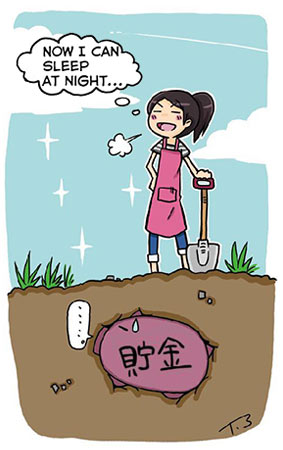The roles of men and women in Japan can be quite different from in the West, for example the general practice of women quitting their jobs — even if they’ve got a good career going — to get married then re-entering for workforce a few years later when the kids enter school. Another practice in Japanese families is that the wife will usually be the one to manage the family’s finances and savings, giving her husband an “allowance” that he can use to go drinking after work with. Japanese women are very conservative with their savings, usually keeping it in cash in the local bank earning a meager 0.025% interest rather than take any risk with it like stocks or mutual funds. They must be doing something right, however, because the average Japanese household has an amazing $200,000 in cash or fixed-period savings accounts, don’t ask me how. Those wily Japanese women are also good at keeping a “secret savings” (called a hesokuri, written with kanji meaning “money hidden in their belly button”) which they don’t tell their husbands about.

Women handle the family savings in Japan.















